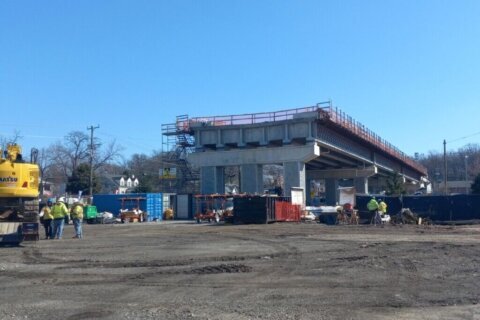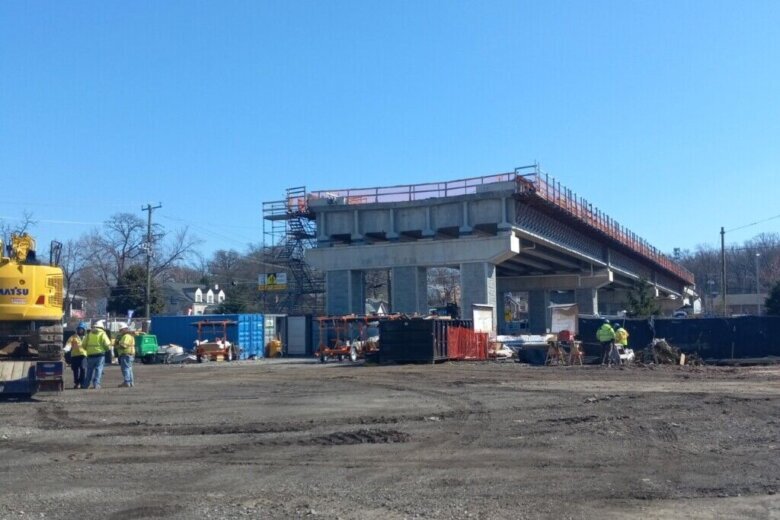This article was republished with permission from WTOP’s news partners at Maryland Matters. Sign up for Maryland Matters’ free email subscription today.

The Maryland Transit Administration will seek approval next month for as much as $425 million in “relief payments” related to delays in the Purple Line light rail project.
Officials announced the extra payments along with a roughly 234-day delay that will push the line’s completion back from spring of 2027 to December of that year.
“The MTA team has been working incredibly hard and over the past year,” Holly Arnold, administrator of the Maryland Transit Administration, said in an interview Friday. “We did complete the utility work. So, October the utility work was completed. December the operations and maintenance facility work was complete. We’re now out of that part of the construction business and so it really is now on the concessionaire and the design builder. But as part of that, we did need to kind of do a final change order to close out that chapter of the project. And so that’s what this is doing now.”
“We made the choice at that time: Let’s keep everything going with this. It’s an important project. We need to keep advancing it,” Arnold said. “We don’t want to let the community sit with it half finished and suffer for two years. And so doing that we did take on a lot of utility work. Which is a risky part of any project.”
Nearly 90% of the utility work is now complete. Ray Biggs, a senior project director with the administration said the remaining work should not cause additional delays or costs.
The 16.2 mile east-west line connects the New Carrollton Metro station in Prince George’s County and the Bethesda Metro station in Montgomery County and includes 21 stops.
The line is being built under a Public-Private Partnership or P3 agreement. Purple Line Transit Partners agrees to build the system for the state and maintain it over three decades. The state pays the private company and when the term is over, the entire project reverts to state ownership.
The project — proposed under former Gov. Martin O’Malley (D) — broke ground in 2016, a year after former Gov. Larry Hogan (R) was sworn into office. Hogan canceled a similar project in 2015 — Baltimore’s Red Line — calling it “a boondoggle.”
At that time, the cost of the Purple Line project for the nearly four-decade span was pegged at $5.6 billion.
Biggs said the project is now 65% complete, with 13 of 21 stations in active construction. Additionally nearly 17,000 linear feet of track has been laid.
The first light rail vehicle is expected to arrive from Elmira, New York, this spring.
As part of the agreement, Purple Line Transit Partners will receive an initial $60 million from the state. Additional payments will be made as the company hits certain milestones such as the delivery of rail cars.
Other milestones include completion of major construction work on the University of Maryland College Park campus, the reopening of the Capital Crescent hiker-biker trail between Silver Spring and Bethesda, and commencement of systems testing, Arnold said
Seven months ago, the Board of Public Works approved an additional $148 million in payments to Purple Line Transit Partners. The money covered cost overruns and delays that pushed the project to spring of 2027.
The utility work payment is on top of $449 million in payments spread out over the next several years that is part of an increase already in the proposed Consolidated Transportation Program.
Arnold said those funds are part of the state’s contractual obligations to pay the builder for maintaining the project as well as for repaying of the bonds.
Gov. Wes Moore (D), speaking at the time, said he was “firmly committed to making sure we’re getting this critical project back on track and also minimizing future delays and costs.”
State Comptroller Brooke Lierman (D) at the meeting said she believed “we’re all done with additional delays and more modifications for the Purple Line.”
Arnold on Friday called that July request an interim payment.
The additional funding being sought pushes the cost of the project to about $4 billion. Including financing over the 36-year life of the project, the cost is $10 billion.
This breaking news story has been updated with more details.








